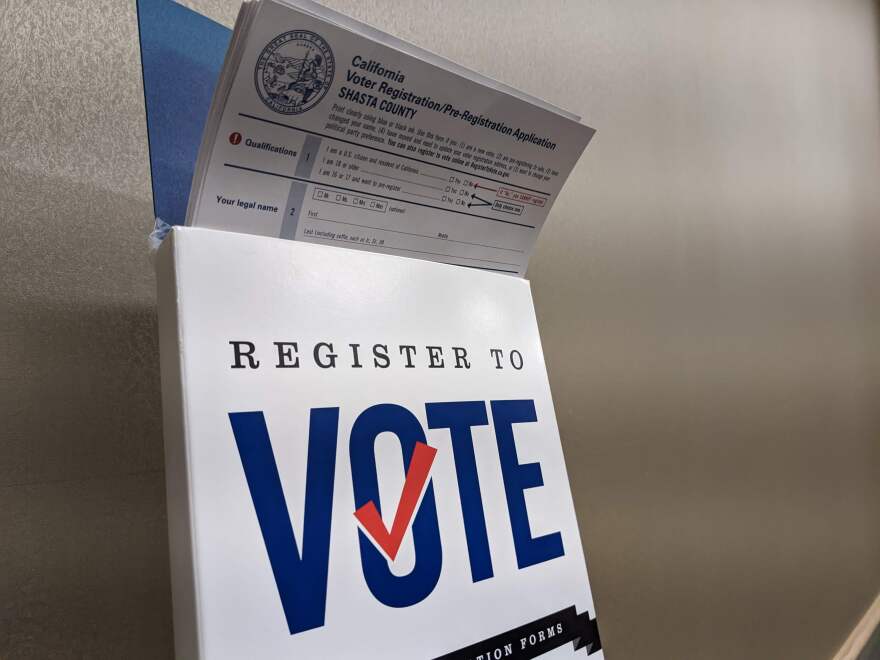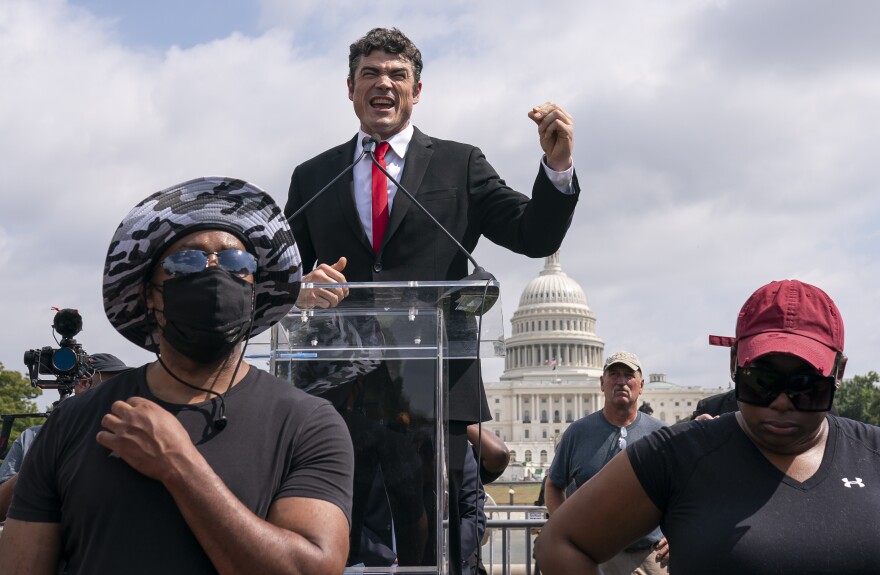The recent primary election in Shasta County in far northern California struck a nerve with some of the county’s far-right constituents. Voters elected a more moderate slate of local and county-wide candidates rather than choosing ultra-conservative politicians.
At his family’s gun store in Redding, California, Shasta County Supervisor Patrick Jones says what he saw during the latest election is driving his motivation to further confirm the results.
“With the work that went into it, the money that went into it, the effort, the issues. It doesn’t smell right,” he says. “It doesn’t look right, it doesn’t smell right.”
All six of the candidates Jones endorsed lost their primary elections, with the two supervisor positions heading to a runoff this November.
Jones believes in the possibility that somebody interfered in the primary election, but he’s offered no hard evidence.

When asked what he wants to see done, Jones says a full independent review of the ballots is needed to ensure no cheating occurred.
At the Shasta County elections office, County Clerk Cathy Darling Allen says these claims of election fraud are making it hard to build trust in the process.
“I believe it, frankly, is an attack on our system and I’m not alone in that,” she says. “It’s happening all over the nation.”
She says a lot of these claims aren’t coming from local residents, they’re introduced by national election fraud speakers such as Mike Lindell or Seth Keshel, fueled by former President Trump’s denial of the 2020 election results.
“Several folks – who are doing something almost like a tent revival – have been here in Shasta County and given their presentation about the algorithms that are responsible for changing votes, from the Italian space lasers and the bamboo in the ballot paper, and all those other rumors that are false,” Darling Allen says.
She adds those speakers often charge up to $40 per person to listen to their claims, making thousands off the speeches they give all around the country.
“We know it’s safe and secure. But there are people who’ve just never had to think about it in Oregon. They’ve just trusted it and used it for 20 years."
Those same speakers have traveled throughout the entire Pacific Northwest, attacking the security of the longstanding vote-by-mail systems in Oregon and Washington.
Oregon Secretary of State Shemia Fagan, a Democrat, says the Oregon election system is popular among Democrats and Republicans, and was built with fraud protections in mind.
“We know it’s safe and secure,” Fagan says. “But there are people who’ve just never had to think about it in Oregon. They’ve just trusted it and used it for 20 years. But they’re suddenly hearing from people in other states who’ve never thought about vote-by-mail or knew about vote-by-mail until the 2020 election.”
Fagan says elections officials around the state, like Cathy Darling Allen, are facing new challenges.
“People love their job, they love facilitating democracy for their neighbors,” Fagan says. “But it’s different now because it’s also a little bit scary and exhausting.”
Fagan says she herself has also faced threats, including serious ones they’ve had to refer to police.
“There were some people that sent me an email saying I was being tried for treason.” she says. “They held a trial against me on Zoom, and then they let me know that I had been convicted of treason. And then, of course, they say the punishment for treason is death.”
She says threats like that make it harder for her office to reach more people around the state. She’d love to host larger town hall meetings to hear about and address voter’s concerns, but safety concerns make that difficult.

Many of these election conspiracy theorists, like Patrick Jones in Shasta County, are calling for a “forensic audit,” the details of which are often vague. Originally a financial term, a forensic audit could mean examining voting machines for tampering, checking computer logs and re-examining ballots from past elections.
Fagan says Oregon already conducts post-election audits of voting machines and they’ve never differed from hand counts.
“The idea of a forensic audit is something people don’t actually want if they know what it is because we have a right to privacy in our voting,” Fagan says.
Elections systems include a number of checks to ensure that a person’s vote remains private. A forensic audit could potentially throw out the right to a private ballot.
These national claims of election fraud are playing out in local races over who will control the elections system. In Klickitat County, Washington, Republican JoAnne Chambers is one of two candidates for county auditor and has amplified claims of election fraud.
“I have not heard of problems with the election in Klickitat County, I just know nationally there seems to be a lot of questions that aren’t being answered,” she says.
A number of other candidates in Washington are running on an “election integrity” platform, including Joe Kent, the Trump-endorsed congressional candidate in the 3rd district. Loren Culp, the 2020 GOP nominee for governor in Washington, claimed election fraud after losing that race by a huge margin and continued pushing that issue during an unsuccessful congressional run in the Republican primary this year.

Political scientist Neil O’Brian at the University of Oregon says the past few elections have driven hyper-partisan polarization.
“These views, I think, are pretty sticky,” he says. “It’s not because of a lack of information. It’s because of these deep attachments: partisan, racial, ethnic, class-based, religious based. And information isn’t gonna break those ties.”
O’Brian says the real danger comes from the increasing distrust in the system, no matter how safe it actually is.
“There are rules, but the rules only matter if everybody or mostly everybody wants to play by them,” O’Brian says. “If you have an entire party that doesn’t want to play by the rules, that’s a serious threat to the functioning of our government.”
O’Brian says the filter-bubble created by social media and from interacting only with people who share similar beliefs mean people are less trusting of those outside that bubble.
Shemia Fagan acknowledges that as a Democrat, she’s not going to be a trustworthy source for many of the folks in the state.
“We’re trying to work with our partners — non-partisan county elections officials, colleagues of mine who I served with in the legislature who are Republicans — to try to help them be the trusted voice for their communities,” she says.
“If you have an entire party that doesn’t want to play by the rules, that’s a serious threat to the functioning of our government.”
The past two Secretaries of State in Oregon and in Washington have been Republican, and all defended vote-by-mail.
Fagan says she’s trying to show Oregon voters behind the curtain of the elections system, to help people better understand the numerous checks in place that keep the system secure.
Similar to when claims of election fraud popped up in Shasta County after their primary election, or when protestors stormed the U.S. Capitol after the 2020 election, O’Brian says the real challenge is whether the elections system can withstand an attack once the results come in.
David Hyde of KUOW in Seattle contributed to this story.
This story is part of a collaboration among public radio stations in the Northwest News Network covering the 2022 election season.



